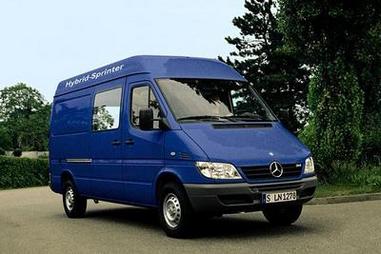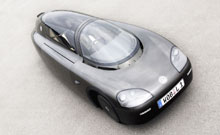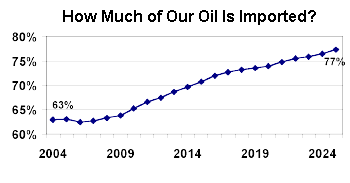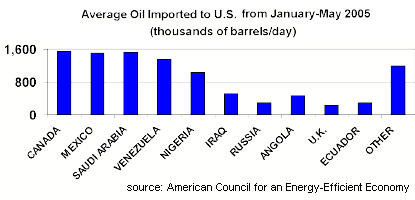

|
| weblog/wEssays archives | home | |
|
The Winning Trifecta (September 13, 2006) The Winning Trifecta: Save the U.S. Auto Industry, Provide Healthcare, and Stop Importing Oil  Here is a bold, practical plan to solve three severe crises
facing the nation: the decline of the U.S. auto industry, the unaffordable-Medicare/Medicaid,
46-million-with-no-health-insurance mess and the "addiction to foreign oil" than our
President so recently pinpointed as a problem. I call it "The Winning Trifecta."
Here is a bold, practical plan to solve three severe crises
facing the nation: the decline of the U.S. auto industry, the unaffordable-Medicare/Medicaid,
46-million-with-no-health-insurance mess and the "addiction to foreign oil" than our
President so recently pinpointed as a problem. I call it "The Winning Trifecta."
Win #1. Save the U.S. auto industry by re-tooling to build super-efficient "cool" vehicles. In the current issue of Scientific American (which I recommended here a week ago), Energy's Future, the article "The Rise of Renewable Energy," contains a sidebar entitled "Plugging Hybrids" which states: "If the entire U.S. vehicle fleet were replaced overnight with plug-in hybrid electric vehicles (PHEVs), the nation's oil consumption would decrease by 70% or more, completely eliminating the need for petroleum imports.What's not to like? I know, I know, Americans demand "sporty" acceleration. My pal Arrol Gellner has the answer: electric drives beat the heck out of gasoline engines. It's true: electric motors have instant torque. There's no waiting around for RPMs to climb. You get instant acceleration. Sure, you need a big enough motor to accelerate the car/truck, but cutting vehicle weight is the other side of the equation: less mass requires less energy. Bottom line: a savvy car company could market a PHEV as the hottest sport vehicle on the road. The "cool" factor would be immense. Not only can you beat an "old" gas truck off the line, you also get outrageously great mileage and cut carbon emissions to near zero. What exactly is a PHEV? It's simply a gasoline/electric hybrid with a good-sized battery. You plug the car in at night (when the draw on the power grid is lowest) to charge the battery, and then go the next morning. If/when the battery is drained, or when certain conditions apply (like a steep hill), the gas engine (running 10% ethanol, why not?) starts up and boosts the power output. People are already making their own PHEVs by tossing a couple batteries in their Toyota or Honda hybrid cars.  According to the current issue of Scientific American (Sept. 2006), Volkswagen has come up with a lightweight two-passenger
prototype "city car" which gets 240 miles per gallon. (See the article
"Fueling our Transportation Future". You can find the issue at your library.)
OK, so it's not for the freeways;
Americans have two or three vehicles anyway, so why not make one of them super-efficient
for short trips?
According to the current issue of Scientific American (Sept. 2006), Volkswagen has come up with a lightweight two-passenger
prototype "city car" which gets 240 miles per gallon. (See the article
"Fueling our Transportation Future". You can find the issue at your library.)
OK, so it's not for the freeways;
Americans have two or three vehicles anyway, so why not make one of them super-efficient
for short trips?
So we have the product and the marketing campaign. Now we get rid of the albatross which threatens to bankrupt GM and Ford: healthcare costs. "Each more than 100 years old, Ford and GM are victims of being successful for too long. GM has 476,000 retirees. Ford provides health insurance for 590,000 people at an annual cost of $3.5 billion. Both Ford and GM have health insurance costs of about $1,100 per vehicle. Neither Asian nor European producers are burdened by such costs."Win #2. Institute a limited and therefore affordable national healthcare plan which covers all Americans, enabling U.S. corporations to compete on a level playing field with foreign companies whose employees are all covered by government-provided healthcare insurance. Referring to the auto industry's healthcare liabilities, knowledgeable reader John B. made this comment: I know some people go crazy about national health care but it is the only way out. I believe corporate America is also starting to like the idea. Then they will not have to pay the cost themselves. Just think -- all of GM and Ford's health care problems will disappear.  Win #3. Drastically reduce and then eliminate foreign oil imports by mandating PHEVs
in government fleets and then in all vehicles. The changeover will take a decade or two,
but look at the enormous benefits in air quality, carbon reduction/global warming, and in the politics
of oil. How to keep the Oil Industry happy? let them make $100 billion in solar panels,
as BP and other oil giants already do. How to create 50% of the nation's electricity with
solar panels to feed the PHEVs? It's actually brain-dead easy: put panels on all existing
building roofs, and
tie them into the existing electrical grid. After all, they're already all connected; how
hard can it be to place a meter for electricity flowing out as well as in? Such a system
is already mandated by California's Million Solar Roofs campaign.
Win #3. Drastically reduce and then eliminate foreign oil imports by mandating PHEVs
in government fleets and then in all vehicles. The changeover will take a decade or two,
but look at the enormous benefits in air quality, carbon reduction/global warming, and in the politics
of oil. How to keep the Oil Industry happy? let them make $100 billion in solar panels,
as BP and other oil giants already do. How to create 50% of the nation's electricity with
solar panels to feed the PHEVs? It's actually brain-dead easy: put panels on all existing
building roofs, and
tie them into the existing electrical grid. After all, they're already all connected; how
hard can it be to place a meter for electricity flowing out as well as in? Such a system
is already mandated by California's Million Solar Roofs campaign.
 If this seems implausible, then read
The Solar Economy: Renewable Energy for a Sustainable Global Future
If this seems implausible, then read
The Solar Economy: Renewable Energy for a Sustainable Global FutureFor more on this subject and a wide array of other topics, please visit my weblog. copyright © 2006 Charles Hugh Smith. All rights reserved in all media. I would be honored if you linked this wEssay to your site, or printed a copy for your own use. |
||
| weblog/wEssays | home |